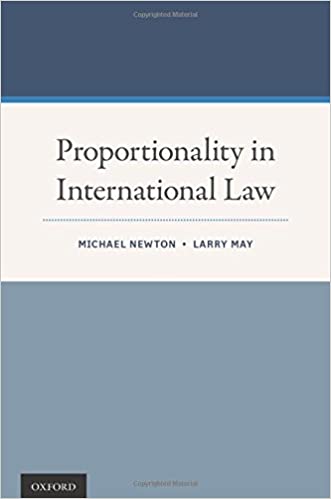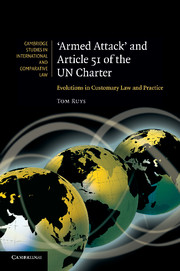Proportionality is intimately linked to the overarching concepts of self-defense, lawful force, and the controlled application of violence. It is one of the most visible facets of humanitarian law designed to reduce unnecessary human suffering and avoid excessive damage to property, and the natural environment. However, its application has come under renewed scrutiny and sustained controversy as a result of wars against non-state actors and from the extensive use of drones, human shields, cyber war techniques, and counterinsurgency tactics.
Proportionality in International Law critically assesses the law of proportionality in normative terms combining abstract philosophical and legal analysis with highly emotive contemporary combat cases. The principle of proportionality permits actions that are logically linked to the intended goal, and thus defines the permissible boundaries for the initiation and conduct of modern wars. The case studies discussed in this book are predominantly from the perspective of those who make decisions in the midst of armed conflict, bringing analytic rigor to the debates as well as sensitivity to facts on the ground. The authors analyze modern usages of proportionality across a wide range of contexts enabling a more complete comprehension of the values that it preserves. This book contrasts the applications of proportionality in both jus ad bellum (the law and morality of resort to force) and within jus in bello (the doctrines applicable for using force in the midst of conflicts). Proportionality in International Law provides the reader with a unique interdisciplinary approach, offering practitioners and policymakers alike greater clarity over how proportionality should be understood in theory and in practice.
چکیده فارسی
تناسب ارتباط تنگاتنگی با مفاهیم فراگیر دفاع شخصی، نیروی قانونی و اعمال کنترل شده خشونت دارد. این یکی از بارزترین جنبه های حقوق بشردوستانه است که برای کاهش رنج های غیرضروری انسانی و جلوگیری از آسیب بیش از حد به اموال و محیط طبیعی طراحی شده است. با این حال، کاربرد آن در نتیجه جنگها علیه بازیگران غیردولتی و استفاده گسترده از هواپیماهای بدون سرنشین، سپرهای انسانی، تکنیکهای جنگ سایبری و تاکتیکهای ضد شورش، مجدداً مورد بررسی قرار گرفته و مناقشات پایداری را به دنبال داشته است.
تناسب در حقوق بینالملل قانون تناسب را با عبارات هنجاری ارزیابی انتقادی میکند که تجزیه و تحلیل انتزاعی فلسفی و حقوقی را با موارد بسیار هیجانانگیز رزمی معاصر ترکیب میکند. اصل تناسب اجازه اعمالی را می دهد که به طور منطقی با هدف مورد نظر مرتبط است و بنابراین مرزهای مجاز برای شروع و اجرای جنگ های مدرن را مشخص می کند. مطالعات موردی مورد بحث در این کتاب عمدتاً از دیدگاه کسانی است که در بحبوحه درگیریهای مسلحانه تصمیم میگیرند و دقت تحلیلی را به بحثها و همچنین حساسیت به حقایق روی زمین میآورند. نویسندگان کاربردهای مدرن تناسب را در طیف وسیعی از زمینهها تجزیه و تحلیل میکنند و درک کاملتری از ارزشهایی را که حفظ میکند امکانپذیر میسازد. این کتاب کاربردهای تناسب را هم در jus ad bellum (قانون و اخلاق توسل به زور) و هم در jus in bello (دکترین های قابل اعمال برای استفاده از زور در در میان درگیری ها). تناسب در حقوق بینالملل رویکرد بینرشتهای منحصربهفردی را در اختیار خواننده قرار میدهد و به دست اندرکاران و سیاستگذاران به طور یکسان وضوح بیشتری در مورد چگونگی درک تناسب در تئوری و عمل ارائه میدهد.
ادامه ...
بستن ...
- ISBN-10 : 0199355037
- ISBN-13 : 978-0199355037
ادامه ...
بستن ...










